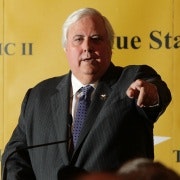Conquering the dark days of capitalism
On Monday night in Sydney, a glittering crowd of Australia's business and media elite listened to controversial US thinker and writer, Charles Murray criticise, ahem, elites. His topic was why capitalism is on the nose and what to do about it.
His diagnosis is that America, and perhaps the West, has been poisoned by highly-educated, group-thinking elites who live in isolated bubbles completely removed from the people they serve and the missions they're entrusted with. As he said, people who have never had to hold down a job where a body part hurts at the end of the day.
Two institutions apart from business that come to mind as possibly suffering from the same disease are possibly the Catholic Church and that other holy of holies, the BBC.
But back to business. Murray rightly criticised "crony capitalism”. Adam Smith said it too, back in the 18th century, that "people of the same trade seldom meet together, even for merriment and diversion, but the conversation ends in a conspiracy against the public, or in some contrivance to raise prices.”
Here's a modern example, though not one Murray gave: the Libor inter-bank rate-fixing scandal in the UK, a cartel that appears to have systematically harmed the integrity of global capital markets.
In June, Barclays PLC's outgoing chairman admitted that the company's role in the scandal had "dealt a devastating blow” to its reputation.
Unsaid by him, but far more important, was how the sordid episode also gave an unfair free kick to the legions of people already feeling jaded by the free-market system.
Yet the manipulation of Libor was not capitalism at work. It was that other C-word that Murray used, cronyism – an apparently illegal cartel of chums sitting around in leather Chesterfields scratching each other's backs, indifferent to the harm they were wreaking on the clients they were paid to serve and subverting a crucial price-setting infrastructure.
Crony cartels are a leech on capitalism; competition is its lifeblood.
The usual incentive to form, or join, a cartel is so customers pay more, boosting profits for shareholders and, more immediately, bonuses for executives. But that's not only wrong, it's dumb. Once the secret combination is uncovered, a company's most valued asset – trust – shatters. Barclays agreed to a fine of almost $500 million and, following the revelation, saw its share price plummet, ripping billions out of innocent shareholders' pockets, wrecking years of good work.
Examples like this encourage many people to mistake crony capitalism as the host, when it is really the parasite.
Murray went on to say that crony capitalism, though important, was trivial compared to a broader more insidious "collusive capitalism” between the public sector and the private sector, such as is demonstrated by Washington DC's notorious lobbying system. The example he gave was the collusion between government and banks that directly led to the sub-prime mortgage crisis.
While he's right, comparatively, I suggest he was rash in ascribing the word "trivial” to crony capitalism. While it normally doesn't have systemic effects like the Libor example, it has nevertheless damaged the businesses and reputations of many otherwise fine firms.
Even so, Murray correctly panned the new elites in business who see "capitalism as no more than a convenient way to make money” and he issued a refreshing call that business should return to a "vocabulary of virtue”.
But is it merely these new elites who are at fault? Or should the old elites shoulder some of the blame for the pervasiveness of this purely "show me the money” mentality?
The attitude that "capitalism is no more than a convenient way to make money” sounds uncomfortably close to Milton Friedman, who famously said: "Only people have responsibilities, not business” and "the only social responsibility of business is to work to increase its profits so long as it stays within the rules of the game…”
Yes, there is indeed enormous virtue in making profits, through employing people, paying taxes, satisfying customers, working with suppliers, and so on.
But Friedman's prescription is expressed narrowly, about what business does, not how it should do it. How we do it matters deeply, as the sorry Libor example demonstrates.
View the full text of Charles Murray's speech here.
John M Green is a leading company director, commentator and novelist. His latest thriller, about a US presidential election, Born to Run, is now in paperback and ebook. Click here for a free chapter and book trailer.













